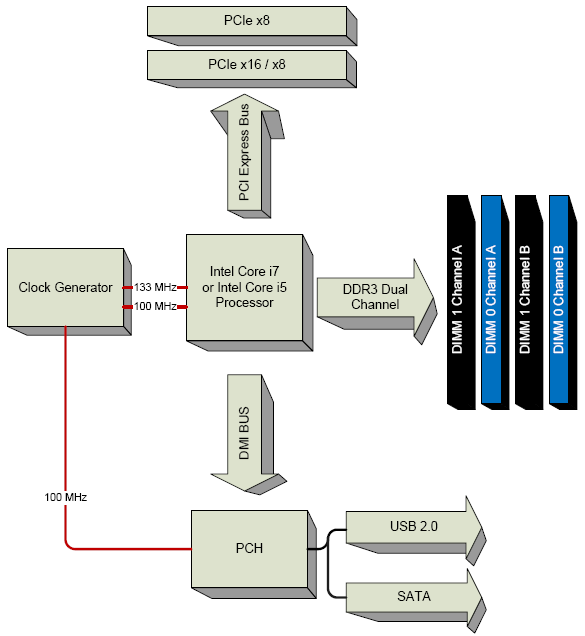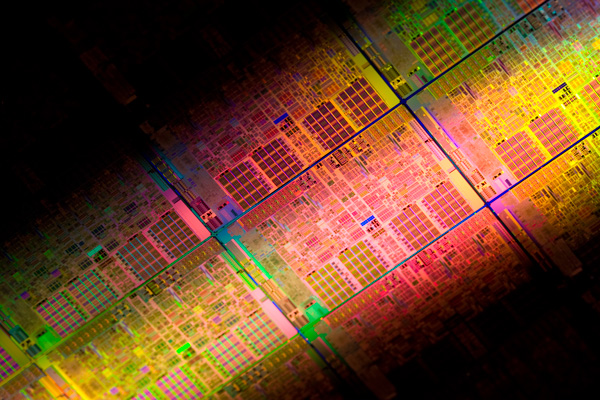Hyper Threading, P55 and Socket LGA 1156
Hyper Threading
 Inevitably, chips based on the Nehalem family will have between two and eight cores, and will be capable of handling two independent software threads per core. This is called Hyper Threading, Intel's name for the concept. It allows a processor to execute two different code streams at pretty much the same time.
Inevitably, chips based on the Nehalem family will have between two and eight cores, and will be capable of handling two independent software threads per core. This is called Hyper Threading, Intel's name for the concept. It allows a processor to execute two different code streams at pretty much the same time.
This was a feature found in Intel's single-core Pentium 4 processors but largely discontinued with the advent of multicore chips, but it's essentially the same technology as before. With two threads per core, Core i7 chips will pack no less than eight logical cores.
If you look at the screenshot to the right you can see that happening. We'll do some benchmarks today with both HT enabled and disabled, you'll be surprised how much difference it can make.
Mind you that the Core i7 870 and 860 have Hyper Threading, the Core i5 750 series does not (unfortunately) have Hyper Threading.
The P55 Chipset
The Intel Lynnfield socket LGA 1156 processors must be paired with the Intel P55 chipset. This chipset will replace the P45 and launches today along with the three processors.
We'll have a separate P55 article today covering MSI's finest motherboard. P55 supports both Lynnfield 45nm Nehalem-based quad-cores and IGP dual-core Nehalem processors codenamed Havendale. Havendale will be launched later, likely Q1 2010.
The P55 chipset supports one PCIe x16 or two eight-speed PCIe cards and it is a single chip architecture. It is pin compatible with future Intel 5 series chipsets.
When it comes to input / output capabilities the P55 chipset will support 14 USB 2.0 ports with integrated USB 2.0 rate matching hubs, 6 SATA 3.0 Gb/s ports and an integrated Gigabit LAN. The chipset also supports Integrated Clocking Buffer Through Mode, provides thermal sensor data via SMBUS for discrete fan control solutions and Intel Matrix Storage Technology 9.0. New Intel Matrix Storage has a new user interface for managing all storage related tasks, support for RAID 0,1,5 and 10, Rapid Recover technology and FIS-based port multiplier support on 2 SATA ports.

The socket mystery... Socket LGA 1156
Along with the P55 chipset the Core i7 870, 760 and Core i5 750 series processors must be seated on Socket 1156. Another question from your side would be what's the actual difference between LGA 1366 and LGA 1156 socket based processors? Well, next the the physical change, LGA 1156 will not have support for triple channel memory, and that's confusing as we now face the fact that two new Core i7 processors will physically not fit onto an X58 motherboard. You need to be very aware of that. The 900 series Core i7 processors are based on Socket 1366 and the Core i7 800 series on Socket 1156.
And yes, it's confusing for the end-user.
Wait -- Is that all?
Ehm no... Intel has got a lot in store in the upcoming year or so. We placed all data that we know of into a chart, also this is a handy chart to see which processor has which socket/package and what more you can expect in the near future.
| Model | LGA socket | Core/Thread | Clock | Turbo boost | L3 cache | TDP | Price | |
| 45nm Bloomfield |
Core i7 975 | 1366 | 4/8 | 3.33 | 3.60 | 8 | 130 | 999 |
| Core i7 950 | 1366 | 4/8 | 3.06 | 3.46 | 8 | 130 | 562 | |
| Core i7 920 | 1366 | 4/8 | 2.66 | 2.93 | 8 | 130 | 284 | |
| 45nm Lynnfield |
Core i7 870 | 1156 | 4/8 | 2.93 | 3.60 | 8 | 95 | 562 |
| Core i7 860 | 1156 | 4/8 | 2.80 | 3.46 | 8 | 95 | 284 | |
| Core i 870s | 1156 | 4/8 | 2.80 | 3.46 | 8 | 82 | 337 | |
| Core i5 750 | 1156 | 4/4 | 2.66 | 3.20 | 8 | 95 | 196 | |
| Core i5 750s | 1156 | 4/4 | 2.66 | 3.20 | 8 | 82 | 259 | |
| 32nm Clarkdale |
Core i5 670 | 1156 | 2/4 | 3.46 | 3.73 | 4 | 73 | 284 |
| Core i5 661 | 1156 | 2/4 | 3.33 | 3.60 | 4 | 73 | 196 | |
| Core i5 660 | 1156 | 2/4 | 3.33 | 3.60 | 4 | 73 | 196 | |
| Core i5 650 | 1156 | 2/4 | 3.20 | 3.40 | 4 | 73 | 176 | |
| Core i5 540 | 1156 | 2/4 | 3.06 | none | 4 | 73 | 143 | |
| Core i5 530 | 1156 | 2/4 | 2.93 | none | 4 | 73 | 123 | |
| Pentium G9650 | 1156 | 2/2 | 2.80 | none | 4 | 73 | 87 |
Anyway, enough tech chatter -- let's have a look at the processors in more detail. Over the next pages we'll show some photos, CPU-Z screenshots, then we'll overclock and look at heat and power consumption and only then we'll dive into a nice deep benchmark session to see where exactly these processors position themselves amongst the other Intel and AMD CPUs.

